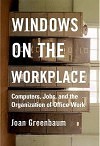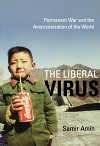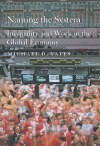United States

In this eye-opening book, Joan Greenbaum tells the story of changes in management policies, work organization, and the design of office information systems from the 1950s to the present. Windows on the Workplace takes us behind the news stories of the highly efficient, high-tech workplace and shows us the ways in which technologies—computers, mobile phones, the internet—have been adapted by management to reshape the way work is done. In tracing the introduction of new technologies, Greenbaum reveals how organizations use them to benefit from both increased profits and more intense control over the workforce. | more…
In this issue, we reprint Albert Einstein’s article “Why Socialism?,” from vol. 1, no. 1 of MR (May 1949). Normally this would require no comment on our part, as it has become something of an MR tradition to run this essay in our May issue. This year, however, there are two special circumstances that require some discussion. The first is Time magazine’s treatment of Einstein’s political views in its December 31, 1999, issue on “Albert Einstein: Person of the Century.” The second is the recent release, on the FBI’s web page, of Einstein’s FBI file to the general public | more…

Samir Amin’s ambitious new book argues that the ongoing American project to dominate the world through military force has its roots in European liberalism, but has developed certain features of liberal ideology in a new and uniquely dangerous form. Where European political culture since the French Revolution has given a central place to values of equality, the American state has developed to serve the interests of capital alone, and is now exporting this model throughout the world. American imperialism, Amin argues, will be far more barbaric than earlier forms, pillaging natural resources and destroying the lives of the poor. | more…
This space has, from its earliest years, been devoted to MR affairs, viewing the readers as part of a larger family. Recently, we began to use the space for commentary on political and economic developments also. The occasion of Paul’s 90th on April 10, however, calls for something very different. If you guess that this will be a love letter, you are not mistaken. I have long wanted to express publicly my feelings about Paul. A review of his contributions to knowledge and theoretical analysis about capitalism and socialism would require a long essay. I prefer to say a few words about him as my friend and comrade | more…

The symptoms of the crisis of the U.S. media are well-known—a decline in hard news, the growth of info-tainment and advertorials, staff cuts and concentration of ownership, increasing conformity of viewpoint and suppression of genuine debate. McChesney’s new book, The Problem of the Media, gets to the roots of this crisis, explains it, and points a way forward for the growing media reform movement. | more…

For forty years, the annual Socialist Register has brought together leading writers on the left to investigate aspects of a common theme. Contributors to this volume consider what imperialism means in the new century by examining the U.S.-led imperialist project currently transforming relations of global power. | more…
Many MR readers will remember when teaching the theory of evolution was prohibited by law in some U.S. states. This wasn’t just at the time of the infamous Scopes “monkey trial” in 1925 but still decades later. In the 1950s, during the McCarthy era, the anti-evolution law took on a new significance, symbolizing the suppression of intellectual freedom which was the hallmark of that grim episode in U.S. history. In 1955, the ACLU, which had initiated the original constitutional test of the Tennessee law that culminated in the Scopes trial, again called for repeal of the law, as a symbol of every attack on the freedom of thought. That same year, “Inherit the Wind” appeared on Broadway, presenting the “monkey trial” as a thinly disguised metaphor for McCarthyism | more…
In his article on the U.S. economy in this issue, Doug Henwood quotes from a piece by Thomas Friedman in the New York Times Magazine on March 28, and points to the connection between Friedman’s view of globalization and his support for the bombing of Yugoslavia. Well, we read that article and were very much struck by it too. Anyone who thinks we’re over the top when we say things like Ellen did in June’s Review of the Month about the “new imperialism” should just read Friedman’s “Manifesto for the Fast World.” | more…

The workplace has been changed in recent decades by the rise of digital technologies. Parts of a single labor process can be moved around the world, with implications not only for individual workplaces or firms, but for the working class as a whole. Computer operators in India process medical transcriptions for doctors in the United States at one-eighth of what U.S. computer operators would earn, and at four times the salary of an Indian schoolteacher. | more…
This issue marks our fiftieth anniversary. We’re sure our readers don’t need to be told about the odds against a socialist magazine surviving through this particular half century. We began at a time when socialism was a dirty word in the United States, and we’re still here today, in fact growing again, after a decade in which people have been abandoning socialism in droves. | more…
If the United States has ever had a “welfare state,” Social Security must surely be the heart of it. In the world’s most predatory capitalism, this is the closest thing to a humane and equitable institution. An International Monetary Fund (IMF) study has even suggested (but who trusts the IMF?) that the U.S. state pension system is more redistributive than the one in social democratic Sweden. What, then, should we make of Clinton’s proposal for “rescuing” the system? | more…

The economic boom of the 1990s created huge wealth for the bosses, but benefitted workers hardly at all. At the same time, the bosses were able to take the political initiative and even the moral high ground, while workers were often divided against each other. This new book by leading labor analyst Michael D. Yates seeks to explain how this happened, and what can be done about it. | more…





